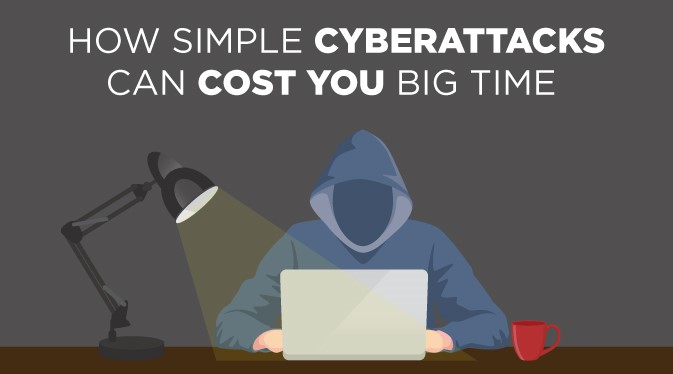How Simple Cyberattacks Can Cost You Big Time
On October 21, 2016, several waves of major cyberattacks against an internet directory service knocked millions of websites offline for most of the day. This attack reminds us that regardless of cybersecurity, just about any hacker can take systems offline downstream; costing the U.S. millions of dollars every year and affecting the annual global economy to the tune of billions lost. Imagine if one of these sites was your bank or sites used by brokers or wall street. How could it affect you, how could it affect the economy, and how can you prepare for the next attack?
What happened
This DDoS attack was simple, but the largest to date. DDoS is short for Distributed Denial of Service. Botnets generate floods of traffic that overwhelms a DNS server with lookup requests. Think of it as a crowd in front of a movie theater preventing anyone from getting in. The overload makes it impossible to open the internet address. On the day of the attack, Twitter, SoundCloud, Spotify, Shopify, Netflix, New York Times, Airbnb, Reddit and many other websites were inaccessible to many users most of the day. Preliminary indications suggest that countless devices that power everyday technology like closed-circuit cameras and smart-home devices were hijacked and used against the servers. It seems like a plot out of a sci-fi movie where toasters and freezers take over the world, but that’s closer to reality than you might think. What’s worse, we have no idea who was responsible for the attack.
Though these types of attacks are usually implemented to censor specific websites by overwhelming them with junk traffic and knocking them offline, we need to keep in mind that it’s possible to overwhelm that directory function and cause outages and loading problems across the internet, affecting any site they target.
Most of us think of those who commit cybercrime as “someone’s brother” sitting in a basement at a computer, but cybercrime is criminal, and it is forcing companies of all sizes in almost every sector to take security measures. The financial industry is an obvious target for an attacker who wants to hit at the heart of world economies.
Measuring the true impact of any cyberattack is difficult at best. Brand damage, business disruption, and loss of intellectual property (IP) are nearly impossible to tally. However, experts estimate that it costs the U.S. about $194 million dollars per year in opportunity and actual losses—and the number of attacks and costs are rising. Because banks are under an almost constant threat of attack, it’s time to think about your finances and the digital connections between banks, businesses, and you.
How it could affect you
Unauthorized access to a system we use regularly is not just a breach of privacy; these attacks can affect us personally, professionally, financially, and emotionally. Denial of service may seem like a mere inconvenience, but think about the implications of your bank or financial services being offline for hours, days, or even weeks. When you think about the personal implications it gets pretty unnerving.
“Cyberattacks on financial institutions are the new norm.” says The Wall Street Journal. And it affects every single U.S. citizen, including the President, as a new form of financial warfare. It’s worth taking a step back and thinking about how to protect yourself.
How it could affect the economy
The stock market is inherently volatile. It goes up and down based on speculation, fear, and opportunity. A massive selloff could be triggered by may events, but imagine if hackers could take down financial sectors for an extended period of time. A big enough attack could do major damage to the US economy.
What you can do
We’re not suggesting you stuff a bunch of cash into your mattress (though that’s not a bad solution if the system is only down for a day or two). You can take some measures to secure your finances long-term by doing the following:
- • Learn all you can about how seriously your bank takes cybersecurity and what defenses they have in place.
- • Be deliberate in setting the amount of money you keep in a bank or in a 401(k). Don’t put in more than you can afford to be without for a period of time.
- • Invest in real, tangible assets like real estate and precious metals.
- • Become your own banker by using The Perpetual Wealth Strategy (we can show you how).
Now that you have a glimpse of the actual and potential financial fallout of cyberattacks on companies, the financial sector, investments, and your access to cash, you may be left feeling like you are without a sound plan to your financial access and strategy. Luckily we have a strategy for you. We always encourage people to build their wealth outside of the shaky foundation of Wall Street and to become their own bank.
We want to show you a way to build wealth and still have access to cash—with certainty, liquidity, and control. The first step to take 2 minutes to sign up for a FREE, extensive eCourse called Infinite 101®. You’ll receive access to video tutorials, articles, and podcasts. It literally costs you nothing to become educated on this ideal financial strategy and start changing your wealth paradigm!
Take advantage of this FREE resource by clicking below.









